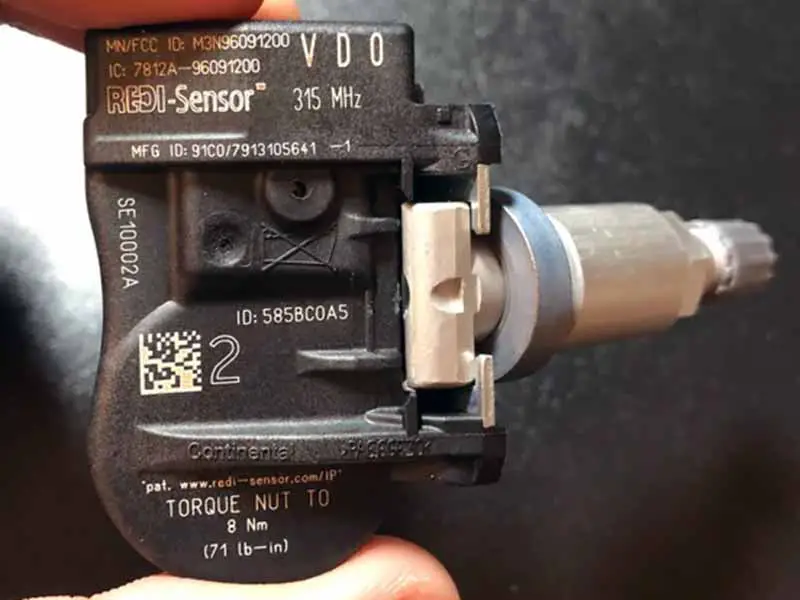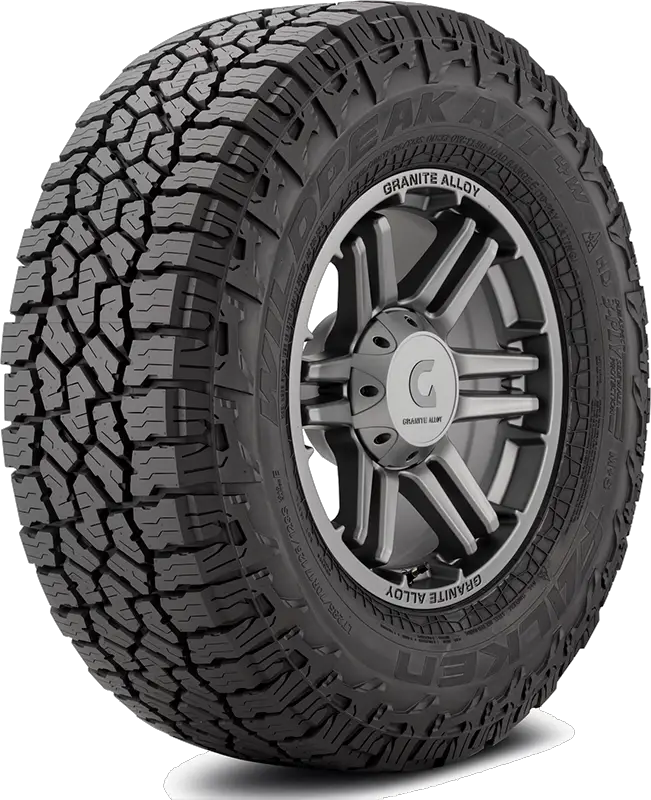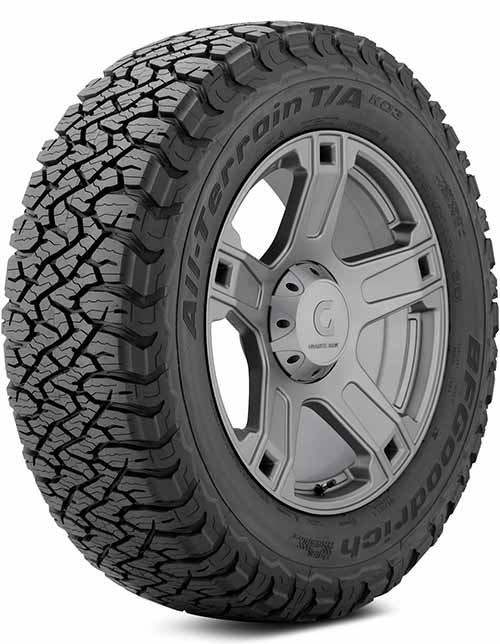Tire pressure might not be something you think about every day, but it’s crucial for your vehicle’s safety and performance. What’s powering the pressure sensors of your tire pressure monitoring system, and can you do anything if it stops working? The answers might surprise you and could even save you money and a potential headache on the road.
Do TPMS Sensors Have Batteries?
Yes, TPMS Sensors have batteries. These are typically coin-sized lithium ion batteries, sealed within the sensor’s molded plastic housing, and not designed for easy replacement.
In this article, we’ll explore the world of TPMS sensors, including what happens when the battery dies, and your options for replacement. We’ll also dive into common questions about replacement cost, and why understanding this small but vital part of your vehicle is essential for every driver.
Let’s take a closer look.
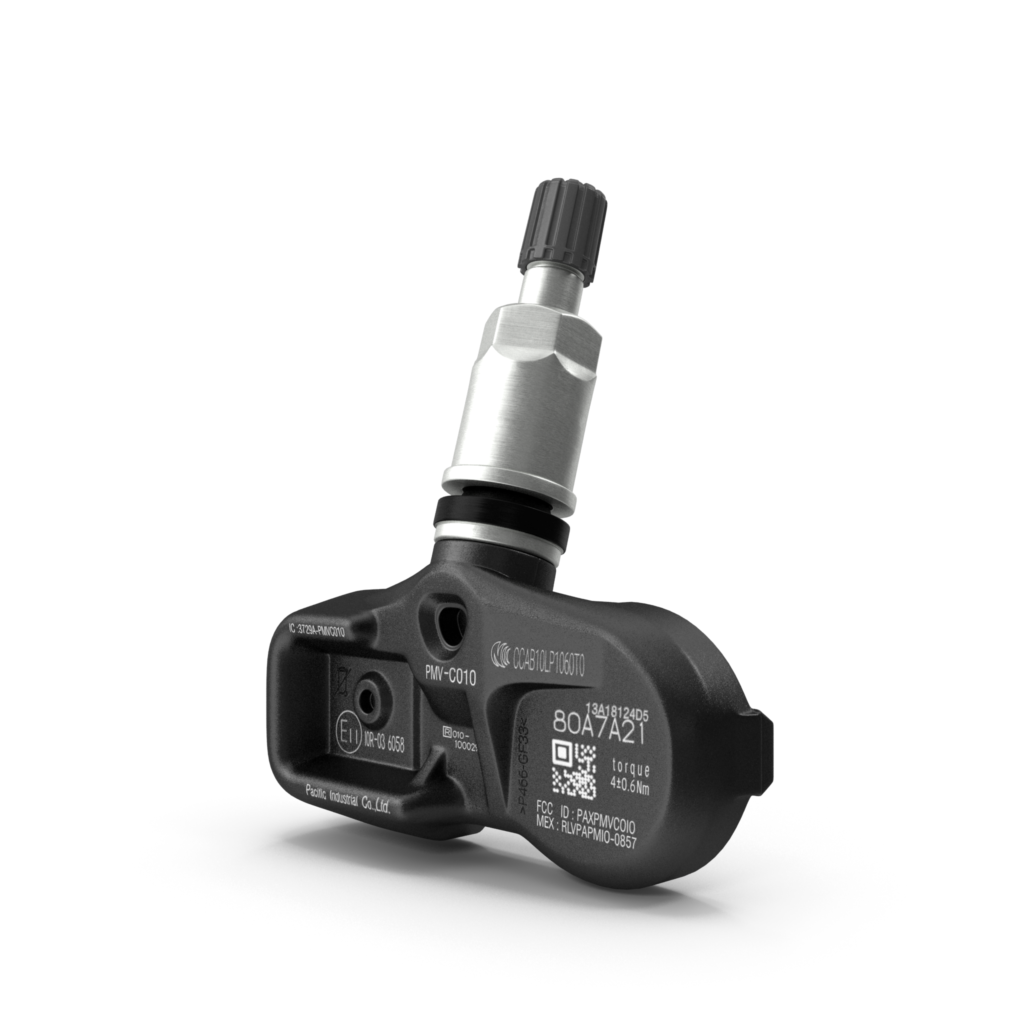
How Do TPMS Sensors Get Power?
First, let’s talk about what TPMS sensors actually are. TPMS stands for Tire Pressure Monitoring System, and it’s like a little helper inside your car or truck’s tires that keeps an eye on the air pressure. It’s there to let you know if the tires have too much or too little air.
Two Types of TPMS: Direct and Indirect
There are two main types of these handy helpers: direct and indirect. Here’s how they differ:
- Direct TPMS Sensors: These have a small device right inside each tire that talks to your car’s computer. It’s like a mini weather station for each tire!
- Indirect TPMS Sensors: These work a bit differently. Instead of being in the tire, they use the car’s other systems, like the speed sensors, to guess the tire pressure. It’s like a detective figuring out what’s going on by looking at clues.
Where the Power Comes From
Now, let’s get to the power part. How do these sensors get the energy to do their job?
Direct TPMS Sensors and Batteries
- Battery-Powered: Most direct TPMS sensors have batteries inside. It’s like the batteries in your TV remote but designed to last longer and handle a bumpy ride.
- Battery Life: These batteries usually last between 5 to 10 years. They’re made to be tough!
Indirect TPMS Sensors
- No Battery Needed: Indirect TPMS sensors don’t need their own battery. They use the car’s main power. Think of it as plugging into the car’s electric grid.
Alternative Power Sources: Energy Harvesting
Some newer direct TPMS sensors use a cool trick called energy harvesting. Instead of relying on batteries:
- Vibration Energy: They gather energy from the vibrations and movement of the tire.
- Storing Energy: This energy gets stored and used to power the sensor. It’s like a rechargeable battery that fills up as you drive!

Autel TPMS Scan Tool
How to Test TPMS Sensor Battery
Just like you’d want to make sure your flashlight has enough battery before going on a camping trip, it’s a good idea to check the battery in your TPMS sensors now and then. If they go out, you might not get a warning if something’s wrong with your tire pressure.
Signs That a TPMS Sensor Battery Might Be Weak
You won’t have to guess if your TPMS sensor battery is getting weak. Your car will usually give you a heads up! Here’s what to look for:
- Warning Light: Sometimes, a light on your dashboard will come on to tell you there’s something up with the TPMS sensor.
- Inconsistent Readings: If the pressure readings are all over the place or just don’t make sense, it could be the battery.
Simple Steps to Test the TPMS Sensor Battery
Now, if you want to test the TPMS sensor battery, you can follow some simple steps. Don’t worry, you don’t have to be a car mechanic to do this!
Visit a Professional
- Find a Local Garage: Many tire shops or car repair places will test the TPMS sensor battery for you.
- Ask for a TPMS Check: Just tell them you’d like a check on your TPMS sensor battery. They’ll know what to do!
Use a TPMS Tool (For the Do-It-Yourself Folks)
- Get a TPMS Testing Tool: These tools are available at auto parts stores. They’re designed to communicate with your TPMS sensor.
- Follow the Instructions: The tool will come with instructions on how to use it. Just follow along, and it’ll tell you if the battery is good or if it needs to be replaced.

What Happens When TPMS Battery Dies?
Imagine driving and suddenly a warning light pops up on your dashboard. It might mean that the battery in your TPMS sensor has died. But what exactly does that mean, and what happens next? Let’s dive into it.
The Warning Signs
First, let’s talk about how you’ll know if the TPMS battery is dead:
- Warning Light: This is usually the first sign that something’s wrong. It’s like your car saying, “Hey, I need some attention here!”
- No Pressure Readings: If you have a system that shows you the exact tire pressure, and it’s not showing anything, the battery might be dead.
What Does This Mean for You?
Now, a dead TPMS battery isn’t the end of the world, but it’s something you’ll want to take care of. Here’s why:
No More Tire Pressure Monitoring
- Flying Blind: Without the TPMS sensor working, you won’t know if your tire pressure is too low or too high. It’s like trying to guess the temperature outside without a thermometer.
- Increased Risk: Proper tire pressure is important for safe driving. Without monitoring, there’s a slight increase in risk.
Need for Manual Checks
- Old School Method: You’ll need to check the tire pressure yourself with a manual gauge. It’s a bit like going back in time before all this fancy technology, but it works!
- Regular Checks: It’s a good idea to check the pressure regularly until you get the battery replaced.
What to Do If Your TPMS Battery Dies
Here’s what you can do if you think your TPMS battery has died:
- Don’t Panic: It’s not an emergency, but you should pay attention to it.
- Check the Tires Yourself: You can use a manual gauge to check the pressure.
- Visit a Professional: They can replace the battery or the whole sensor if needed.
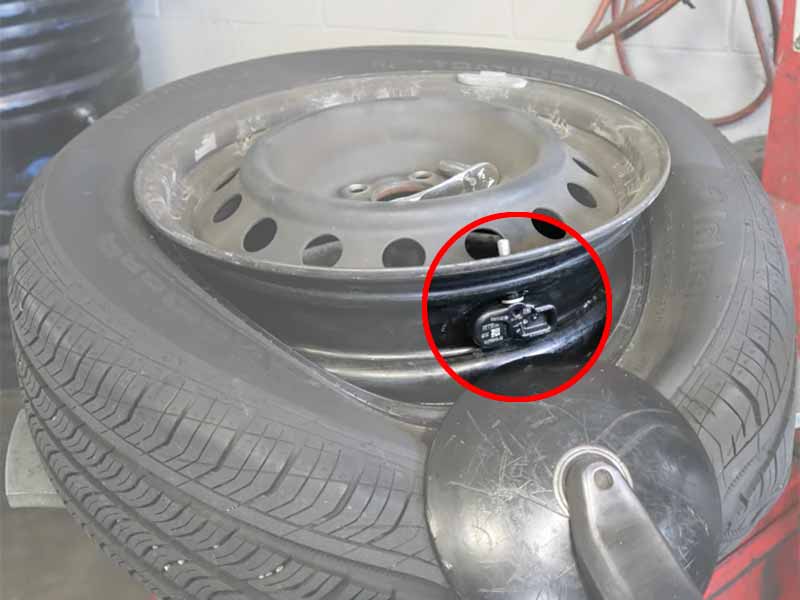
How Long Do TPMS Sensor Batteries Last?
Batteries are like the fuel that keeps the TPMS sensors running, but they don’t last forever. So, how long can you expect these batteries to keep doing their job? Let’s find out.
The Typical Lifespan of a TPMS Sensor Battery
Just like the batteries in your gadgets at home, TPMS sensor batteries have a usual lifespan. Here’s what you can generally expect:
- 5 to 10 Years: Most TPMS sensor batteries will last somewhere between 5 to 10 years. That’s quite a long time in the world of batteries!
What Affects the Lifespan?
But wait, why is there such a range in how long they last? Well, different things can make a battery last longer or shorter. Here’s what might affect it:
Driving Habits
- More Driving: If you drive a lot, the battery may wear out faster.
- Less Driving: If your car sits in the garage most of the time, the battery might last longer.
Weather Conditions
- Hot Weather: Extreme heat can make the battery wear out more quickly.
- Cold Weather: Very cold temperatures can also affect the battery life.
Type of Vehicle
- Different Cars, Different Lifespans: The kind of car or truck you drive might affect how long the TPMS battery lasts.
How to Know If the Battery Is Getting Weak
You won’t be left in the dark about when the battery is getting close to the end of its life. Here’s what might give you a hint:
- Warning Signs: You might see a warning light on your dashboard, or the pressure readings might act a little strange.
- Professional Help: If you’re not sure, you can always ask a car professional to check it for you.
The Bottom Line
The batteries in TPMS sensors are made to last a good while, but they won’t last forever. Think of them like the milk in your fridge. It’s good for quite a while, but eventually, it’ll go bad, and you’ll need to replace it.
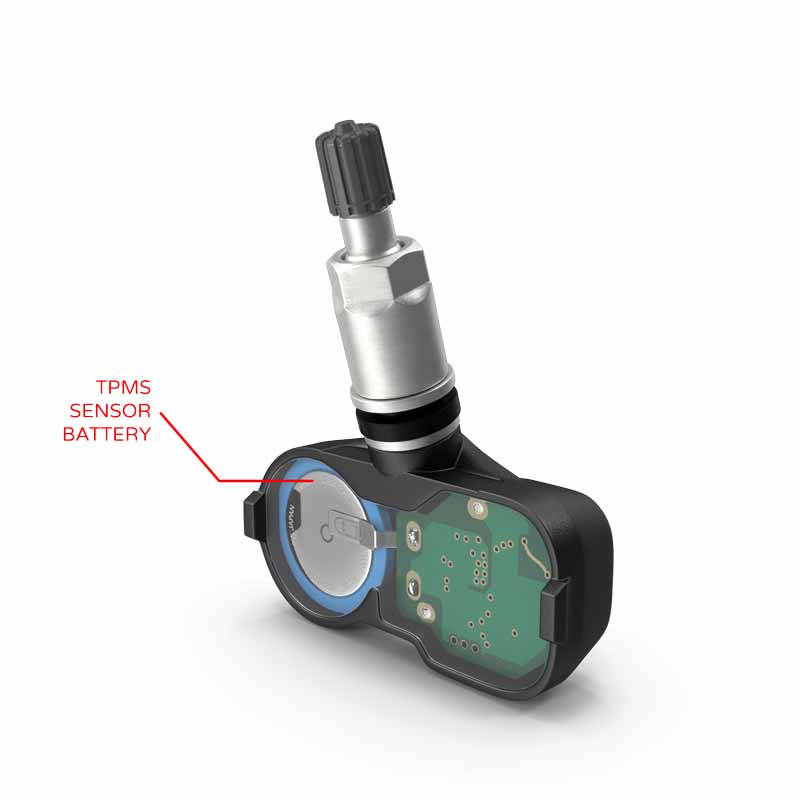
Where Is the TPMS Battery Located?
You’ve probably heard about the TPMS sensors and their batteries by now. But where is this battery hiding? Let’s uncover this hidden treasure and see where it lives.
Inside the Sensor: A Sealed Package
The TPMS battery is like a secret ingredient in a recipe. It’s tucked away inside the sensor, and you can’t see it from the outside. Here’s how it all fits together:
The Sensor’s Home
- In the Wheel: The TPMS sensor is usually located inside the wheel. It’s like having a tiny spy in there, watching your tire pressure.
- Attached to the Valve Stem: Often, the sensor is connected to the tire’s valve stem. That’s the little thing you use to put air in the tire.
The Battery Inside the Sensor
- Sealed Away: The battery is sealed inside the sensor to keep it safe from things like water and dirt. Think of it like a ship in a bottle. It’s in there, but you can’t just reach in and touch it.
- Built as One Unit: Most TPMS sensors and batteries are built as one piece. It’s like a peanut butter and jelly sandwich; you can’t really take them apart.
Why You Can’t Just See the Battery
You might be wondering why you can’t just see the battery. Here’s why:
- Protection: The battery is sealed inside to protect it. It’s like keeping your homework inside a folder so it doesn’t get torn or wet.
- Special Design: The sensor and battery are made to work together in a special way. It’s not meant to be opened up.
What to Do If You Need to Access the Battery
Since the battery is sealed inside the sensor, you can’t just open it up. Here’s what you might do instead:
- Replace the Sensor: If the battery dies, you usually have to replace the whole sensor. It’s like if a pen runs out of ink; you get a new pen.
- Ask for Help: If you’re not sure what to do, a car professional can help. They have the tools and knowledge to handle it.
The Bottom Line
The TPMS battery is hidden away inside the sensor, doing its important job. You can’t see it or touch it, but it’s there, helping to keep your tires in check.
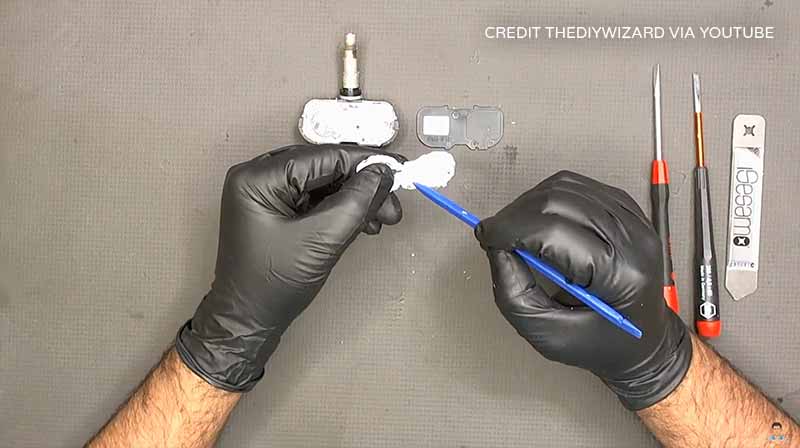
Can TPMS Batteries Be Replaced?
If you’re thinking about replacing the TPMS sensor’s battery yourself, there’s a lot to consider. In most cases, the answer is that it’s not meant to be replaced. Let’s explore why and what your options might be.
Why Most Batteries Can’t Be Replaced
Most TPMS sensor batteries are sealed inside the sensor housing. Here’s why:
- Protection from the Elements: The battery is sealed to keep out moisture and other things that could damage it.
- Special Design: The sensor and battery are often built as one unit.
The DIY Option: Not for the Faint of Heart
If you’re brave and handy, you might think about trying to replace the battery yourself. But be warned, it’s not recommended:
- Cracking Open the Sensor: You would have to crack open the sensor housing, which can be tricky.
- Scraping Out Sealant: There might be sealant inside that you would have to scrape out.
- Resealing the Housing: After replacing the battery, you would have to reseal the housing.
I have written an article for the brave DIYer that explains this process in detail, but the general stance is that the batteries in tire pressure sensors can’t be easily replaced.
The Professional Stance: Replace the Whole Sensor
Most professionals won’t replace the battery for you. Here’s why:
- Labor Cost: The labor cost to replace the battery might be more than just replacing the whole sensor.
- Risk of Damage: There’s a risk of damaging the sensor when trying to replace the battery.
What Happens When the Battery Dies?
Since most TPMS batteries can’t be replaced easily, here’s the usual plan:
- Replace the Whole Sensor: Most people will need to replace the entire sensor.
- Professional Help: A professional at a car or tire shop can do this. They have the tools and know-how to get it done right.
The Bottom Line
While there is a DIY option for replacing the battery, it’s not recommended for most people. Replacing the entire sensor is usually the best and safest route to take.

Autel MX Universal Aftermarket TPMS Sensor
TPMS Sensor Battery Replacement Cost
The TPMS battery is typically a coin-sized watch battery-style part that plays a vital role in your vehicle’s tire pressure monitoring system. But what happens when it needs to be replaced, and what’s the cost? Let’s break it down.
Identifying the Battery Type
If you’re determined to replace the battery yourself, here’s what you’ll need to do:
- Open Up the Sensor: You’ll have to open up your current sensor to see what specific battery is used. This isn’t an easy task, as pressure sensors aren’t designed to be serviced.
- Match the Type: The specific type of battery used will vary between different sensor manufacturers, so make sure to find the exact match.
The Battery’s Price: Pocket Change
The actual price of the battery isn’t much at all:
- Cost: No matter the size or type, these batteries typically cost no more than a couple of dollars.
- The Real Cost: The significant cost is really the labor to perform the job, since sensors aren’t designed to be easily worked on.
The Aftermarket Option: A Cost-Effective Solution
If you’re looking for a cost-effective way to have functioning TPMS sensors in your car or truck, consider the aftermarket option:
- Where to Go: Smaller mom and pop tire shops are typically the best place to inquire about aftermarket sensors.
- Options: They may offer installation of the Autel MX aftermarket sensor or Schrader EZ-Sensor.
- Part Cost: Both of these typically cost around $30 for the part.
- Installation Cost: They’ll still need to charge you for installation, plus mounting and balancing, which adds to the cost.
The Bottom Line
While the idea of replacing the battery yourself may seem tempting, the reality is that it’s not a simple task, and the true cost comes in the labor. The most economical route might be to go with aftermarket sensors and have them professionally installed.
Resources
Below are some links you may find helpful when learning about tires
- Changing TPMS sensor batteries – Tire Review Magazine
- Tire pressure monitoring system (TPMS) sensor replacement cost – Kelly Blue Book
Final Thoughts
Powered by coin-sized batteries, tire pressure monitoring sensors diligently keep track of your vehicle’s tire pressure. While the idea of replacing the battery yourself may seem tempting, the reality is that these batteries are typically sealed inside the sensor housing, making them difficult to replace. Aftermarket sensors provide a cost-effective solution, and understanding the process can save you both money and time.
Remember, your vehicle’s TPMS system is more than just another dashboard light; it’s a critical safety feature. Whether you decide to take on a DIY project or rely on professional service, being informed about your options ensures a smooth ride. It’s the little details like this that contribute to overall vehicle performance and safety, and now you have the knowledge to navigate this essential aspect of your car or truck with confidence.
Good luck and happy motoring.
